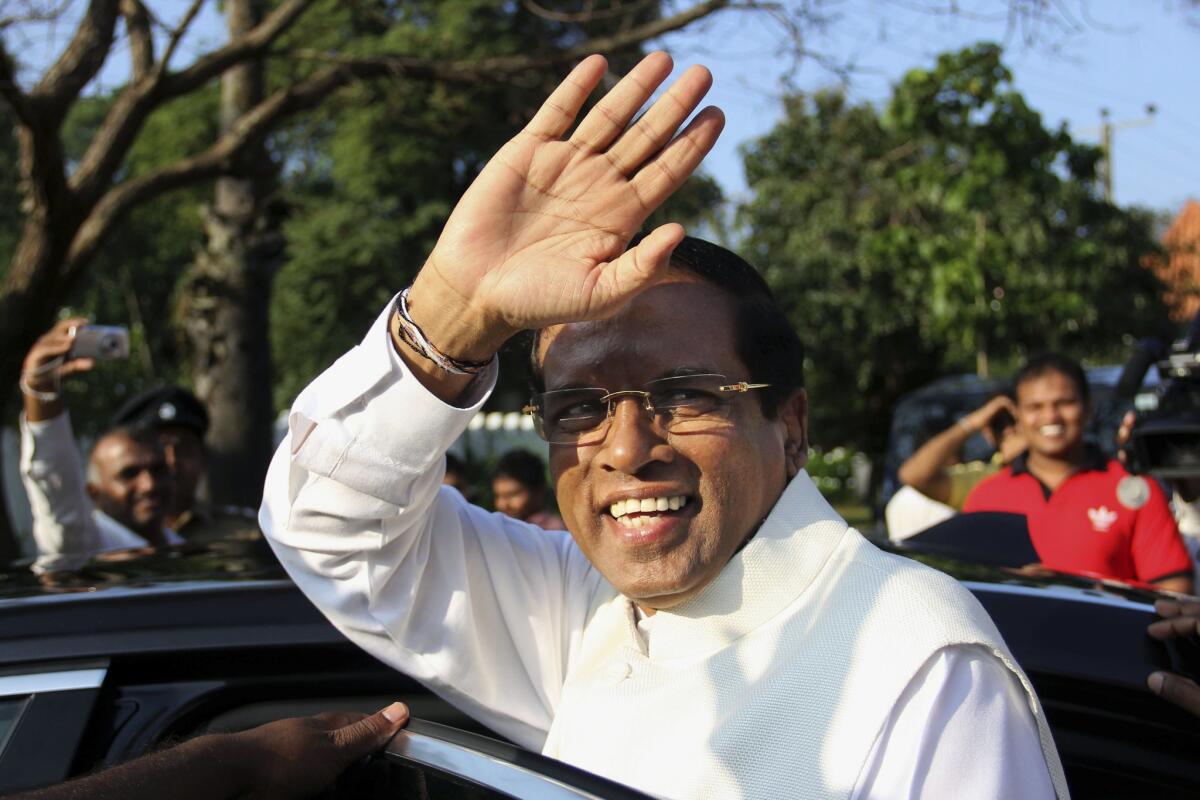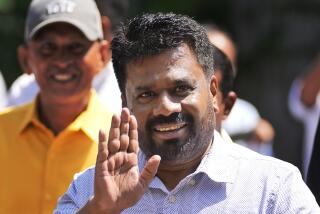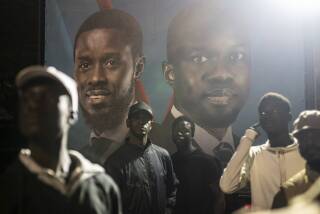Sri Lankan president admits election defeat; challenger sworn in

- Share via
Reporting from Colombo, Sri Lanka — Mahinda Rajapaksa changed Sri Lanka’s constitution so he could seek an unprecedented third term as president. When a key ally defected to run against him, he cut fuel and water prices and announced raises for civil servants to shore up his support.
Days before the vote, Bollywood megastar Salman Khan showed up to campaign for Rajapaksa in a move reportedly orchestrated by the president’s son.
But early Friday, the man long accused of running one of South Asia’s most authoritarian governments quietly stepped aside as election returns showed him losing. He left the presidential residence at 6:30 a.m., congratulated President-elect Maithripala Sirisena – his former health minister whom Rajapaksa’s aides had likened to Judas – and tweeted a gracious salutary message.
“I value and respect our democratic process and the people’s verdict, and look forward to the peaceful transition of power,” Rajapaksa said. “Thank you to all the thousands of Sri Lankans who supported me.”
The stunning turnabout by a wily and often ruthless politician left many in this island nation of 21 million in disbelief. Few expected Rajapaksa to concede defeat after a decade in power during which he touted economic growth, shrugged off allegations of corruption and cronyism and stubbornly refused to reconcile with minorities after crushing Tamil Tiger rebels to end a bloody, 26-year civil war in 2009.
“I’m not surprised that he lost, but I am surprised that he left peacefully,” said Jayadeva Uyangoda, a political science professor at the University of Colombo. “I think he probably knew that given the scale of Sirisena’s victory, it would have precipitated violence if he stayed – and as a politician, he did not want to be blamed for that.”
Sirisena won slightly more than 51% of the 12 million total votes cast, compared with less than 48% for Rajapaksa, according to official results from voting Thursday that was mostly peaceful despite widespread pre-election violence.
Rajapaksa’s departure has raised hopes for a fresh start for both Sri Lanka’s turbulent politics as well as its relations with the world. Many believe he was turning the country into a pariah, refusing calls by the United States and others to investigate alleged wartime atrocities against Tamils and delivering annual screeds against foreign “meddling” at the U.N. General Assembly.
His cold relations with the West prompted Rajapaksa to draw closer to China, resulting in allegations of shady business deals by Chinese companies and angering India, the regional power. Indian Prime Minister Narendra Modi immediately called Sirisena on Friday to congratulate him.
U.S. Secretary of State John F. Kerry said he looked forward to working with Sirisena and commended Rajapaksa “for accepting the results of the election in the proud tradition of peaceful and orderly transfers of power in Sri Lanka.”
Taking the oath of office Friday in Colombo’s Independence Square, a monument to the end of British colonial rule, Sirisena pledged to be a one-term president and to carry out reforms within 100 days.
“I assure you we will work in unity to strengthen our democracy, law and order, and good governance to give our present and future generations a better life,” he said.
Sirisena had a fraction of Rajapaksa’s resources -- which included a heavily partisan state media -- but won over voters by pledging to stamp out corruption, curtail the powers of the presidency and restore the independence of major institutions such as the judiciary, which Rajapaksa stuffed with allies. In a key symbolic move, Sirisena was sworn in by a Supreme Court judge, not the chief justice, a Rajapaksa appointee.
But like the former president, Sirisena is a member of the dominant Sinhalese ethnic group, Buddhists who comprise 70% of the population. He rejects greater autonomy for the marginalized Tamil minority and – though he vowed to launch a domestic inquiry into civil-war era abuses –signaled that Rajapaksa and other leading figures would be shielded from prosecution.
Although Hindu Tamils, who make up 12% of the population, were skeptical of Sirisena, many voted for him as a rebuke to the former administration. Along with Muslims – who have faced deadly violence at the hands of pro-Rajapaksa Buddhist nationalist groups – the minority groups helped give Sirisena his electoral edge.
Experts say Sirisena will have to balance their demands with those of Rajapaksa’s still solid base of Buddhist Sinhalese voters.
Another key test is likely to come in February, when a U.N. human rights panel is due to release a long awaited report on the civil war, focusing on the final days when as many as 40,000 Tamils were allegedly massacred by government forces. The U.S. and others will be watching to see how Sirisena -- who was acting defense minister during the war’s last two weeks but is not believed to be implicated in the worst abuses -- deals with the report’s findings.
“There will remain resistance among the Sinhalese military and political leadership to address the accusations in any kind of deep and forthright way,” said Alan Keenan, Sri Lanka analyst with the International Crisis Group. “It will require political skill, but it’s less of a problem with Sirisena in power.”
Opposition leader Ranil Wickremesinghe, who was sworn in as prime minister, said Rajapaksa will always be remembered as the president who won the war. But analysts say he may also have been thinking of the political future of his family -- including three brothers who held top government posts and a son he was grooming as a successor.
“He is committed to making sure his family could come back to power one day,” Uyangoda said. “I think he examined all his choices and decided that leaving office gracefully was the best political option for the Rajapaksas.”
Special correspondent Mushtaq reported from Colombo and Times staff writer Bengali from Mumbai, India.
Follow @SBengali on Twitter for news out of South Asia
More to Read
Sign up for Essential California
The most important California stories and recommendations in your inbox every morning.
You may occasionally receive promotional content from the Los Angeles Times.











